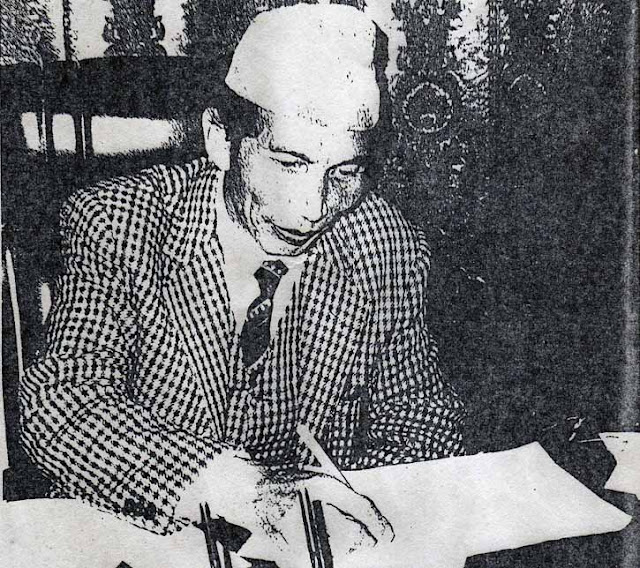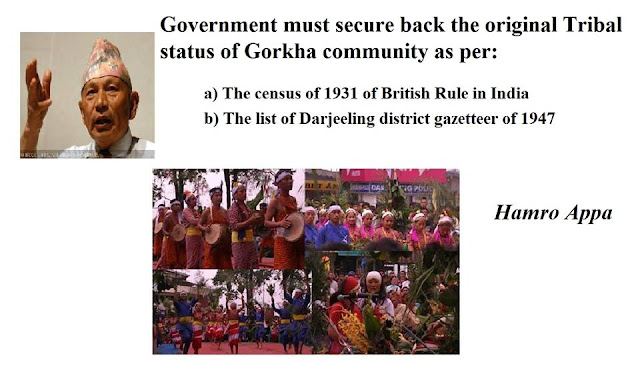Shri Subash Ghisingh always stood for the separate Indian Gorkha Troops, so as to differentiate the “Indo – Nepal Agreement Troops” and the “Indian Gorkha Troops” and to save the whole settled Indian Gorkhas from unnecessary and permanent stigma and allegation of Foreigners, Mercenaries, Reciprocal people and Nepal subjects.
Finally after 30 years on 2nd April 2016, The Army have raised a new Gorkha battalion comprising entirely of Indian Gorkha troops i.e. Sixth Battalion of the First Gorkha Rifles (6/1GR), named “Kanchi Paltan”. Traditionally, the majority of troops in Gorkha regiments belong to Nepal, The stipulated ratio of composition of these regiments between Nepalese and Indian domicile Gorkhas is about 70:30:
Why the need of separate Indian Gorkha Regiment / Battalion?
The separate Indian gorkha regiment or battalion is required so as to have clear distinction between the “Agreement Troops” (the gorkha troops from Nepal / Nepalese citizen) and the “Indian Gorkha Troops ( The gorkha troops from Indian / Indian citizen )”
The Indian Gorkhas had faced and are still facing the unique identity crisis with regard to their Indian citizenship because of the Indo-Nepal Treaty of Peace and Friendship (1950) which permits "the citizen of Nepal or India, the freedom to reside, own the property, participate in trade and commerce and other rights of similar nature in their territory”. Thus, there are many Nepalese citizens of Nepal who have migrated after 1950 living in India. The Indian Gorkhas are mistakenly identified as the citizens of Nepal who have migrated to India in search of jobs and livelihood.
Whereas the history of Indian gorkha starts from The Gorkha War (1814–1816), the war that was fought between Gorkha Kingdom ( Nepal ) and the British East India Company which ended up by signing the Treaty of Sugauli in 1816.
The Sugauli Treaty was signed on 2nd December 1815 and later ratified on 4 March 1816 between East India Company and King of Nepal: however, the treaty asked for the territorial concessions, in which large territory of Nepal was given to British India, and also allowed British to recruit Gurkhas for its military service.
Under the treaty, about “one-third of Gorkha Kingdom (Nepal)” was lost, including Darjeeling, Sikkim, territory to west of the Kali River like Kumaon (present Indian state of Uttarakhand), Garhwal (present Indian state of Uttarakhand); some territories to the west of the Sutlej River like Kangra (present day Himachal Pradesh); and much of the Terai Region, It caused Nepal to lose about “105,000 km2” of its territory.
Later on in 1947, when British India got its Independent creating India and Pakistan, the fate of Indian gorkha was neglected and remained unresolved as Nepal didn’t accepted it back or demanded its lost territory nor did Indian accepted it constitutionally to be its Union of State by declaring these gorkha dominated areas (territory which had come to British India as per Sugauli Teaty) as a state of Gorkahaland, a state which would uphold the identity of Indian gorkha, like the states of Wes Bengal for Indian Bangalis or Punjab for Indian Panjabi.
But rather India signed an agreement with Nepal in 1950 which created the confusion on citizenship of entire gorkha settled in India, the gorkha who had come along with their ceded land to British India began to be called as foreigner on their own homeland in present India.
Hence, Shri Subash Ghisingh not only led the movement for separate state of Gorkhaland, which he believed would resolve our identity crisis in Indian; But also demanded for the separate Indian Gorkha Regiment for Indian Grokha so as to have clear cut distinction between Indian Gorkha and Nepali Gorkha,
Historical archive below :
Date: 15th January 1987:
Telegram sent To Shri Rajiv Gandhi, P M of India, Copy to King of Nepal:
We have no other alternative but to ask the whole settled Indian Gorkhas not to join the “Agreement Troops” of Gorkha Rifles. Furthermore, we are compelled to ask the central Government of India to immediately establish a New and Separate India Gorkha Regiment so as to save the whole settled Gorkhas from unnecessary and permanent stigma and allegation of Foreigners, Mercenaries, Reciprocal people and Nepal subjects.
Date: 3rd February, 1987: Statement released:
Urging government for formation of separate “Indian Gorkha Troops” to save guard the Indian Gorkha community and in the larger interest of Indian.
Date: 22nd July 1987:
Letter To Rajiv Gandhi PM, India:
Point No 9, (iii) The “Indian Gorkha Regiment” must be established as soon as possible so as to make a clear distinction between the “Agreement Troops” and the “Indian Gorkha Troops” in the interest of the victimized Gorkha and in the interest of the country of Indian. After declaration of the Government Notification on the issue of citizenship, the recruitment of the aboriginal and the settled gorkhas to the “Agreement Troops” must be immediately stopped.
However MOS was signed 23rd August 1988 between Subash Ghising (President of GNLF) and CG Somiah (Union Home Secretary) in presence of Sd/ Buta Singh (Union Home Minister) in Delhi:
As regards raising a separate Indian Gorkha Regiment, the policy of the Government of India of not having any new regiment raised on class composition was acknowledge. However, it was clarified that it is not obligatory for Indian Gorkhas to join only specified Gorkha Regiments and that they have the option to join the Regiments of their choice. To this extent suitable instructions will be issued by the Army Headquarters…….
Finally now after 30 year of struggle the government of Indian understood the strategic need of Indian Gorkha battalion to uphold the gorkha regiment FOREVER in India. We view this STRATEGIC decision, not only an employment opportunity BUT also a clear cut distinction between Indina gorkha and Nepalese gorkha citizens.
Source HAMRO APPA












